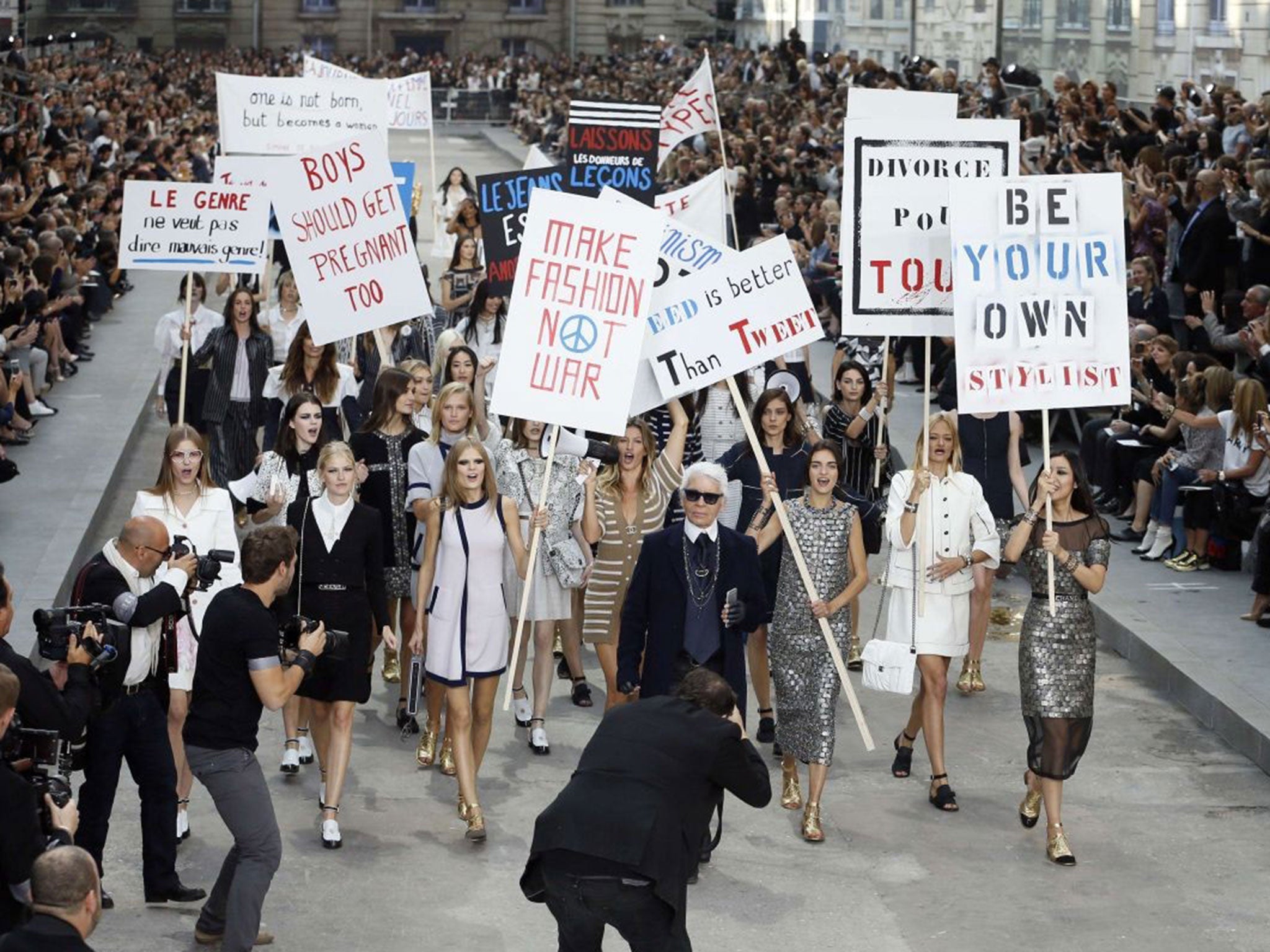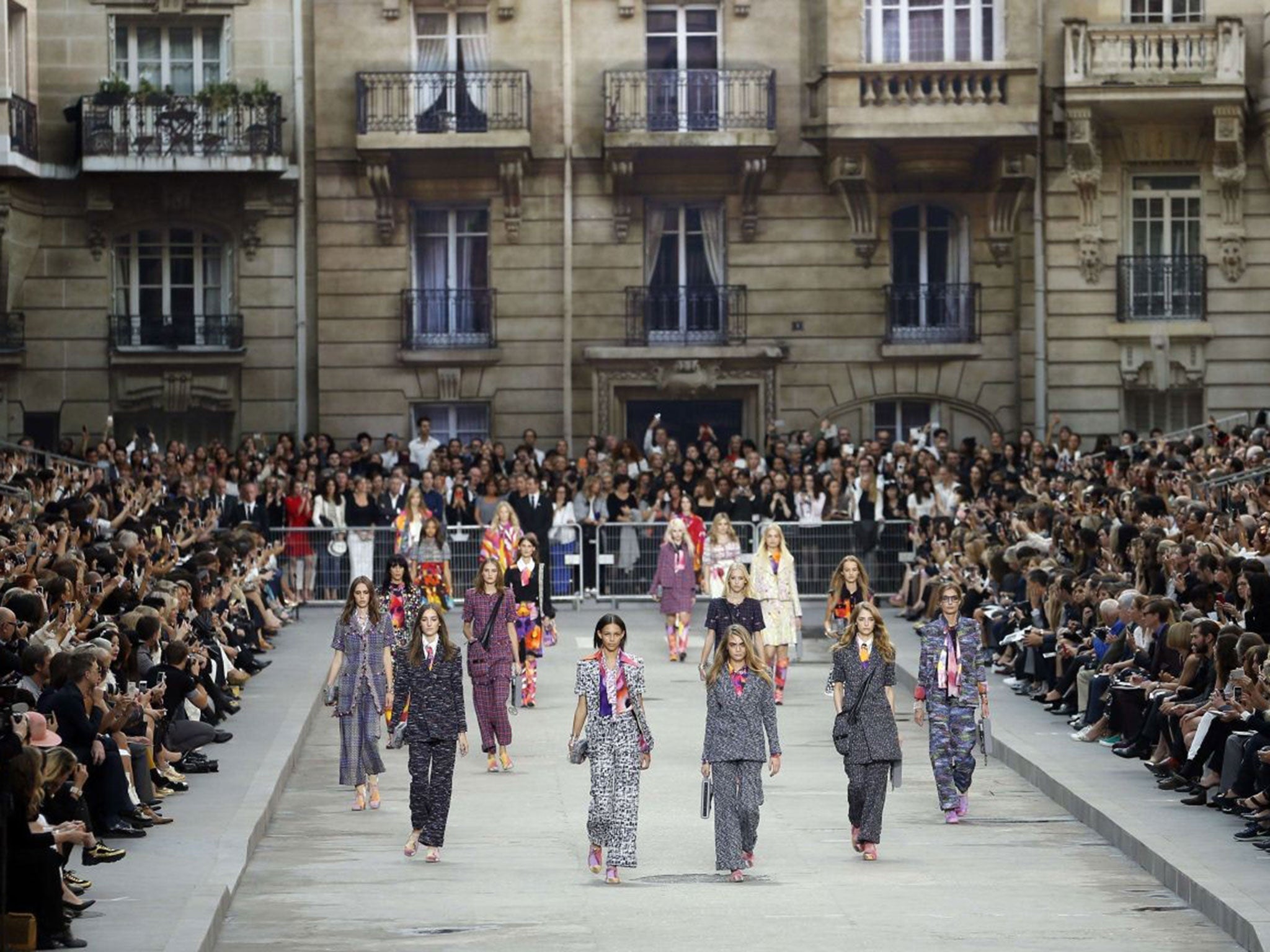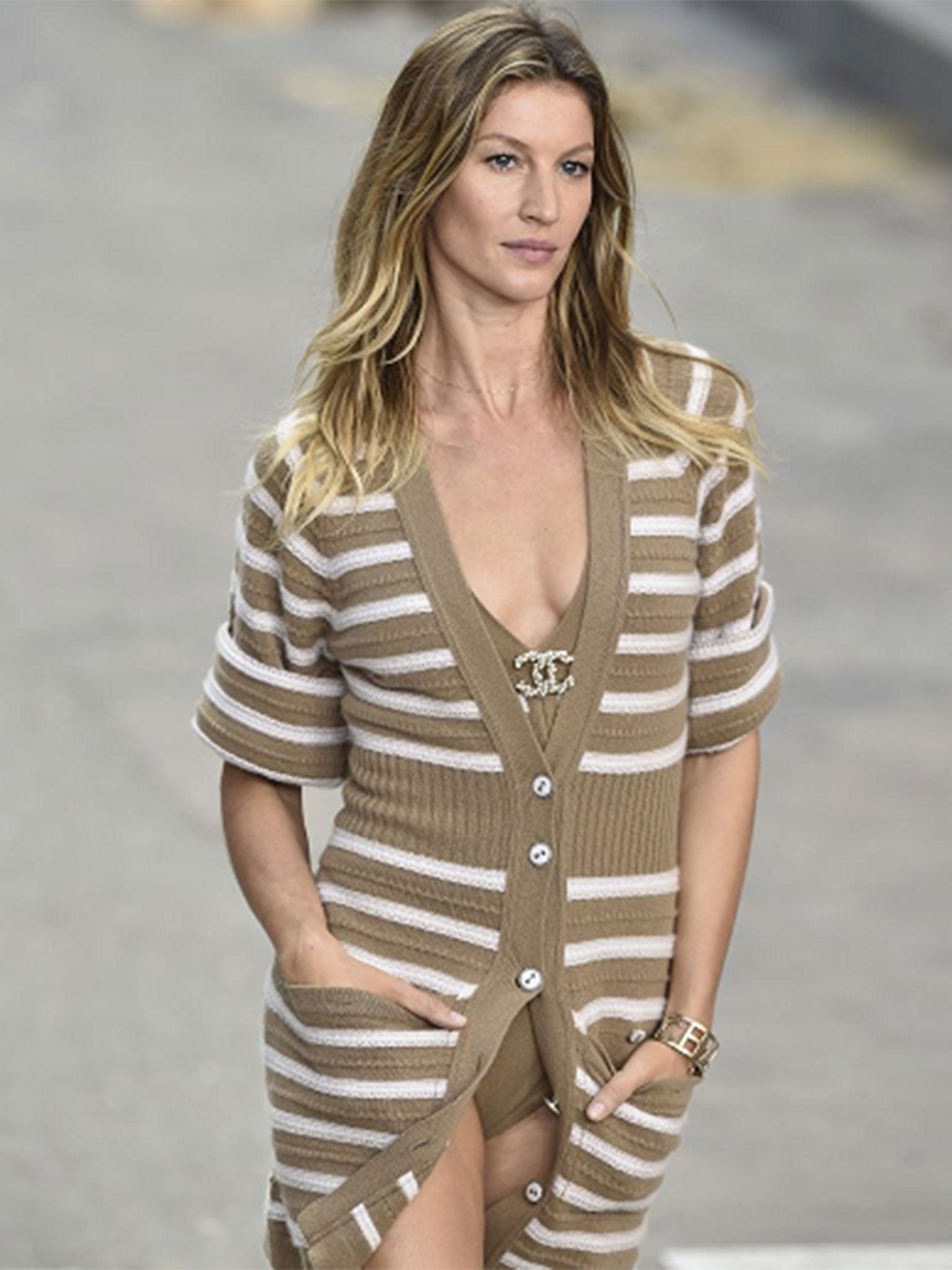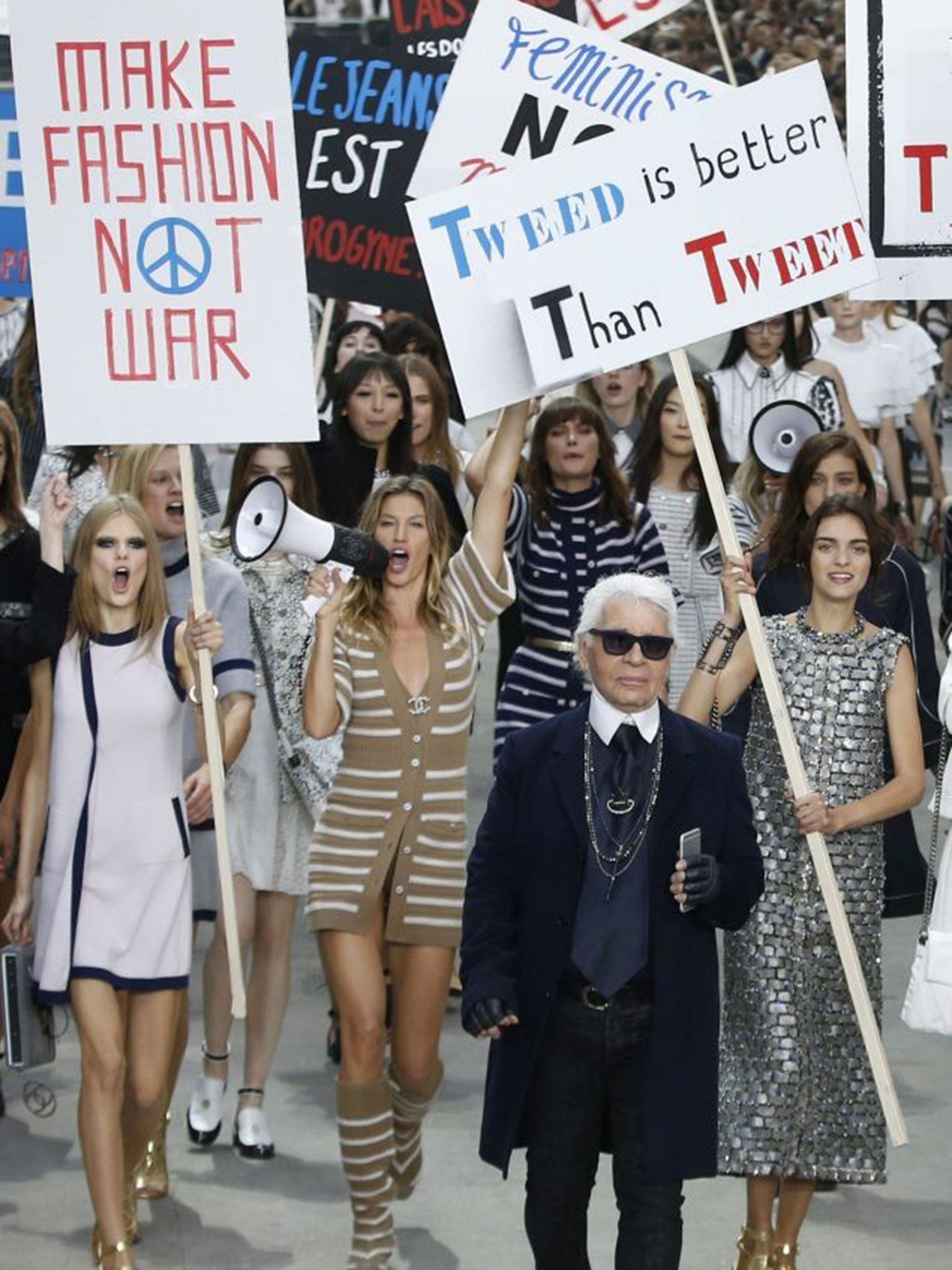Paris Fashion Week: Karl Lagerfeld leads a feminist riot on 'Boulevard Chanel'
Overall, nice collection, but Chanel's riot overshadowed the real message of the clothes on show

Your support helps us to tell the story
From reproductive rights to climate change to Big Tech, The Independent is on the ground when the story is developing. Whether it's investigating the financials of Elon Musk's pro-Trump PAC or producing our latest documentary, 'The A Word', which shines a light on the American women fighting for reproductive rights, we know how important it is to parse out the facts from the messaging.
At such a critical moment in US history, we need reporters on the ground. Your donation allows us to keep sending journalists to speak to both sides of the story.
The Independent is trusted by Americans across the entire political spectrum. And unlike many other quality news outlets, we choose not to lock Americans out of our reporting and analysis with paywalls. We believe quality journalism should be available to everyone, paid for by those who can afford it.
Your support makes all the difference.Baron Haussmann got a Parisian thoroughfare named after himself in the mid-nineteenth century by reconfiguring the city's circulatory road systems into wide, grand avenues. The idea was to widen streets and prevent blockades and riots. It didn't entirely work, but was a noble effort.
What did it take for Chanel to get their own street? Well, if you pump vast amounts of cash into building a set that's a photographic facsimile of a Parisian rue, you can call it whatever you damn well want. So, the models at Karl Lagerfeld's spring/summer 2015 Chanel show sauntered in groups down the centre of "Boulevard Chanel," easily chatting amongst themselves. A few carried boomboxes packed into chic Chanel handbags, the tinny sound reverberating until the thumping main soundtrack took over. "I'm every woman," warbled Whitney Houston, at one point, "It's all in me."
She could have been singing about the collection because, in typical Lagerfeld style, it was all in there. Wide trousers, tunics, print, plain, military, pinstripes, sweaters, Gisele in a striped cardigan and something suspiciously close to a pair of Chanel Uggs. All present and correct, on flat shoes, women striding meaningfully off to work. Which, in the fashion world, means the end of the (catwalk) road and back. There were also, obviously, plenty of bags, printed with faux-politicised slogans like "Féministe mais Feminine," or "Votez Coco."

There's been an undercurrent of women dressing women this week in Paris - Lagerfeld isn't a woman, obviously. But he does operate under the mantle of Coco Chanel, who tied her fashion to the feminist cause, even if she didn't realise it. Clothes, she stated, must be logical. A button should have a buttonhole, and should work. Pockets should be real.
Chanel glorified function over form, or at least the ideal twinning together of the two. Her clothes addressed her own reality, the demands of the clothes she wanted to wear, which found resonance in women in the wider world. It was as simple as the chain handle on her 2.55 handbag, leaving the hands free to get on with something else, or the fact said bag was originally lined in burgundy, to make it easier to find your stuff inside.

Chanel's bag was a form of protest against the impracticality of everyday fashion in the mid fifties - she loathed the corsets and petticoats of the New Look, for instance, and following her 1954 comeback railed against it everyday she could. Likewise, Lagerfeld's faux-sloganeering on his pouches and pochettes were portents of protest to come. After the show finished, models returned to the stage (or rather, the street) brandishing placards daubed with pronouncements like "Make fashion not war" (fair enough), or "Tweed is better than tweet" (a bit of pointless punnery). Their clarion call, via megaphone? "What do we want? Tweed!" Okay.

A few of the models had the good grace to look embarrassed; most seemed to think it was a bit of a laugh. Which also summarised the audience's reaction. Maybe Lagerfeld was cynically poking fun at the whole idea of fashion commenting on culture at large, intentionally reducing its protests to facile fashion commandments rather than an attempt at genuine change. But the co-opting of protest polemic as a tool instigating you to buy, as opposed to question why, struck a bum note. Was tweed all we should read into this collection? Should a fashion show just make you want to go out and charge something, rather than change something?
That's not a judgement on the clothes, which were fine. They were playful, colourful, vibrant. The clusters of models walking together had a bounce and an energy, as well as a reflection of the everyday world. There was something compelling about our odd transportation into a unreal "everyday" Paris street - which ended up feeling more like a scene from Paris When It Sizzles, a choreographed and entirely false occurrence for the benefit of a few thousand onlookers, than a real slice of Paris life.
Perhaps Chanel's riot was inspired those real-life scenes last season, when the fashion press tore apart the Supermarket the label erected in the middle of the Grand Palais - the whole thing was cordoned off with riot barriers this time, just in case. But why riot if you've got nothing to say? Chanel wasn't making a political statement, they were just attracting attention by making a great deal of noise and fuss. It was the artifice of anarchy. A joke, sure, but not an especially funny one.
And it overshadowed the real message of the clothes on show, which in their diversity and lack of fashion diktat, did have something of a feminist, Chanel-for-all message running through them, like the flecks of bright colour through those tweeds.
Looking through the ranks of the audience, and seeing the Chanel jacket crop up again and again, from front-row couture client to standing fashion students, you were arrested by the continuing universality of that style Coco Chanel herself originated. It's a great jacket, but it's not worth rioting over. Haven't we all - fashion designers included - got something more interesting to say than that?
In short? Nice show. Shame it all had to end like that.
Join our commenting forum
Join thought-provoking conversations, follow other Independent readers and see their replies
Comments